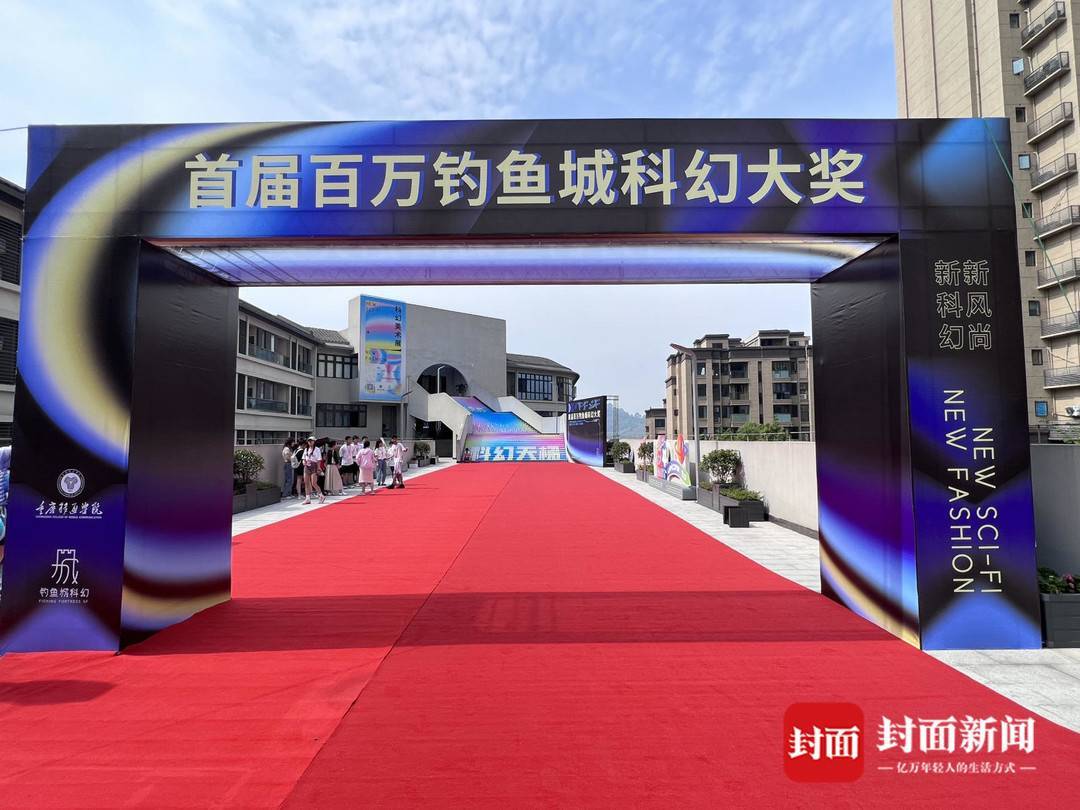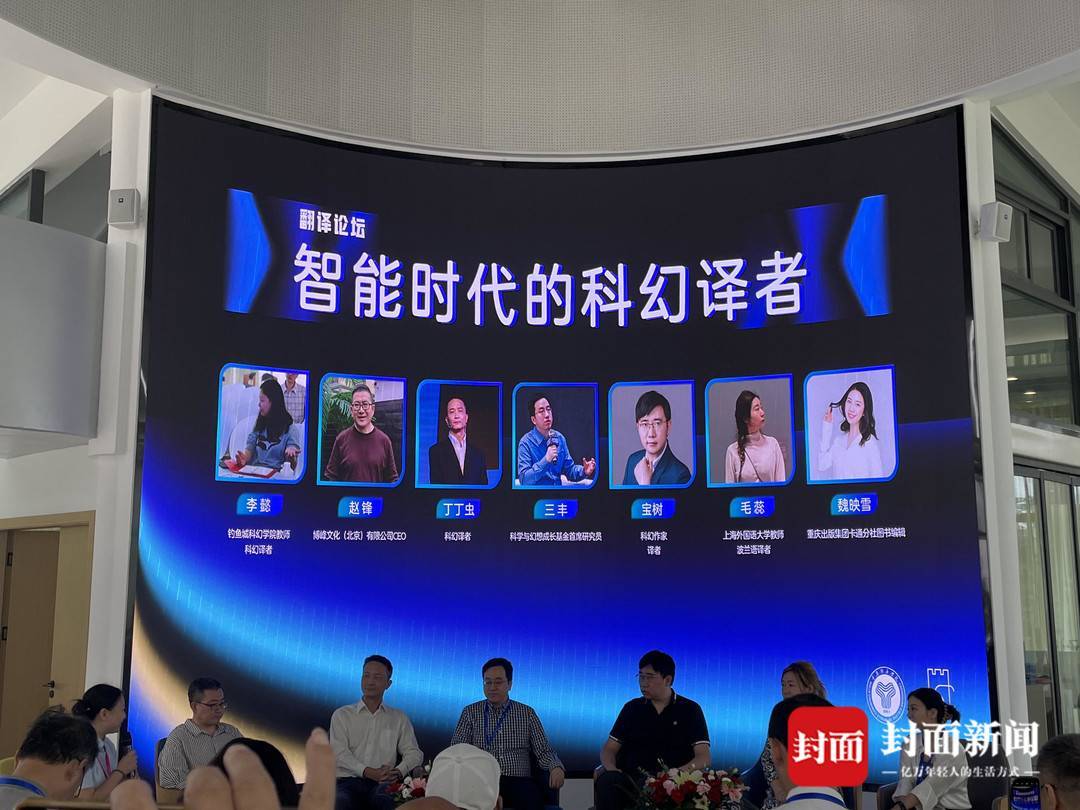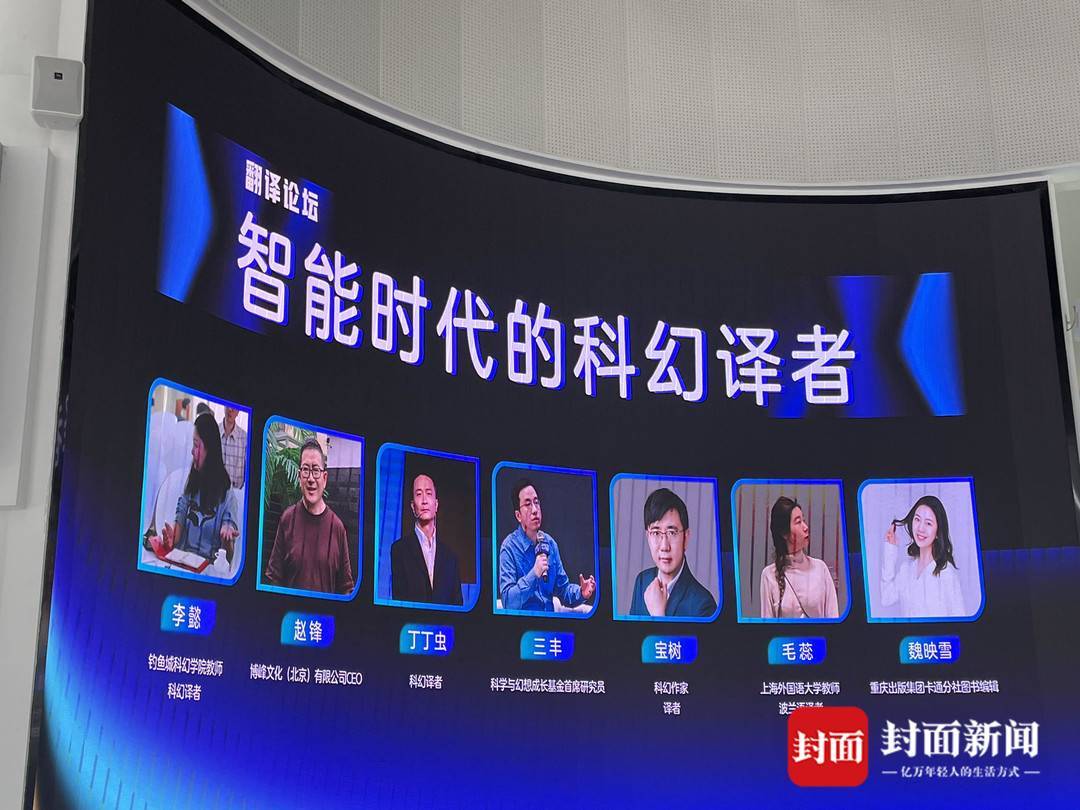
What should science fiction translators do in the era of artificial intelligence? "The top 10% of translation professionals"|Cultural Observation
Cover news reporter Zhang Jie Chongqing Hechuan photo report
The arrival of powerful artificial intelligence software such as Chatgtp has triggered seismic thinking across various industries.. One focus is on which industry jobs are most likely to be replaced by artificial intelligence. Translation work between different languages is considered by many to be one of the "dangerous" jobs most likely to be replaced by artificial intelligence.
Faced with the strong intervention of AI in translation, what should translators in the field of science fiction do? How do they think?

The red carpet scene of the first Million Fishing City Science Fiction Awards
The first Million Fishing City Science Fiction Awards ceremony will be held in Hechuan, Chongqing on the evening of June 10th. Nearly a hundred science fiction-related writers, scholars, editors, filmmakers, university professors, famous middle school teachers, and game practitioners gathered in Diaoyu City to witness this grand ceremony in the science fiction world. Four science fiction-related themed forums were held at Chongqing Yitong University on the morning of the 10th, and the award ceremony began after the forum. Everyone gathered together and conducted in-depth discussions in groups around the four themes of "Guide to Developing Professional Science Fiction Writers", "Science Fiction Translators in the Intelligent Era", "Science Fiction Education Full of Possibilities" and "How to Discover the Local Qualities of Chongqing Science Fiction".
In the forum session of "Science Fiction Translators in the Intelligent Era", hosted by Li Yi, a teacher at the Diaoyucheng Science Fiction College of Chongqing Yitong University and a science fiction translator, the science fiction writer and translator Tintin Chong, Southern University of Science and Technology Science and Human Imagination Sanfeng, a visiting scholar at the Power Center and chief researcher of the Shenzhen Science and Fantasy Growth Fund, Baoshu, a science fiction writer and translator, Mao Rui, a teacher at Shanghai International Studies University and a Polish translator, Wei Yingxue, book editor of the Cartoon Branch of Chongqing Publishing Group, and others conducted detailed discussions on the spot. shared their thoughts.

“Science Fiction Translators in the Intelligent Era” Theme Forum
Experience: Artificial intelligence completes 90%, human translator completes 10%
Tintin Chong, formerly known as Ding Zicheng, is particularly good at Japanese translation in the field of science fiction literature translation. In his opinion, in the translation of a work, artificial intelligence can already do 90% of the work. "The remaining 10% will be completed by humans. Will this 10% also be done in the future?" It is not yet known whether it can be completed by artificial intelligence. The improvement of artificial intelligence in translation will be beneficial to the efficiency of communication among humans who have not yet mastered foreign languages. But for those practitioners who are engaged in translation, it is indeed a big problem crisis. He admitted that the current trend seems to be unstoppable and no one can resist it. As a translator engaged in translation, all I can do is to make full use of artificial intelligence as an auxiliary tool to maximize my work Efficiency, improve your own translation.”

“Science Fiction Translators in the Intelligent Era” Theme Forum
Concerns: Be vigilant and prevent AI from invading the field of human language learning
Sanfeng is a senior researcher and critic of domestic science fiction. He admitted that he has indeed used artificial intelligence software at work. For example, when writing some work letters in foreign languages, he will give the machine some keywords or ideas, and the machine can write very good work emails. This is indeed helpful to improve work efficiency. But he mentioned that everyone should not underestimate the 10% of work that requires people to complete it. “This part of the work is very high-end. It is unlikely to be replaced, but will remain like the current luxury goods and works of art.” Come down. You need to do the 10% well and carefully proofread the 90% that the machine does well."
In Sanfeng’s view, artificial intelligence has caused a huge “shuffle” impact in the translation industry. What is really worth worrying about is that with the great convenience brought by intelligent machines, people no longer have the motivation to learn and master a foreign language. “Perhaps some people will say that humans can leave cumbersome numerical calculations to calculators. , the ability to master a foreign language is also handed over to the machine. After thinking about it, this is still incomparable. It is best not to hand over all the language training ability to the machine, because the ability to actively acquire a foreign language is very important to people. The meaning of its own existence, thoughts, and emotions is relatively large. If human beings want to achieve a high level of 10% in translation, they must fully master the language, otherwise even these 10% will not be competent. Therefore, I personally It is recommended that when developing artificial intelligence, it should be ensured that it cannot interfere with the field of human language learning."
Baoshu is a cutting-edge contemporary science fiction writer. He has published science fiction works in publications such as "Science Fiction World", "People's Literature", "Mind Shuo", and "Super Good Viewing", and also published the novel "Three Body X: Observation" "The Universe of Thoughts", "The Ruins of Time" and short story collections "Songs of the Ancient Earth", "Rhapsody Stories of Time", etc. In addition to writing his own science fiction works, Baoshu himself is also engaged in the translation of some science fiction works. He said frankly that he enjoys translating and feels special pleasure in the translation process. He said that if machines do a lot of translation work in the future, they may face issues involving copyright ambiguity. In addition, Baoshu also mentioned that in the translation of philosophical classics such as "The Complete Works of Plato", excellent translators will refer to dozens of existing translations to carry out careful translations. This kind of translation is still inseparable from the wisdom of human translators.
On this topic, Sanfeng shares the same sentiment. “In the future, 90% of works may be handed over to popular artificial intelligence machine translation, and only 10% of classic works are worthy of human efforts to intervene in translation. Classic works require human beings Translators have a high degree of thinking, judgment, and selection abilities.”
In the era of artificial intelligence, is it still necessary to learn a foreign language? Is it worth it for a person to spend 4 years learning a language in the future? As a teacher at Shanghai International Studies University and a Polish translator, Mao Rui mentioned in her sharing that indeed in this field, some students do have such confusion. However, some students were optimistic about human translators, which moved her. “No matter how powerful the artificial intelligence machine is, it does not seem to have the emotional ability of humans to feel the nuances of the real world.” As for the future of human translators, Predicting that some jobs will become high-end luxury goods, Mao Rui reminded, "Luxury goods are often only available to a few people. But I think that good things should be owned by as many people as possible."
The above is the detailed content of What should science fiction translators do in the era of artificial intelligence? 'The top 10% of translation professionals'|Cultural Observation. For more information, please follow other related articles on the PHP Chinese website!




